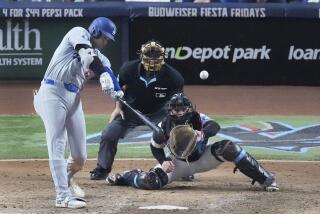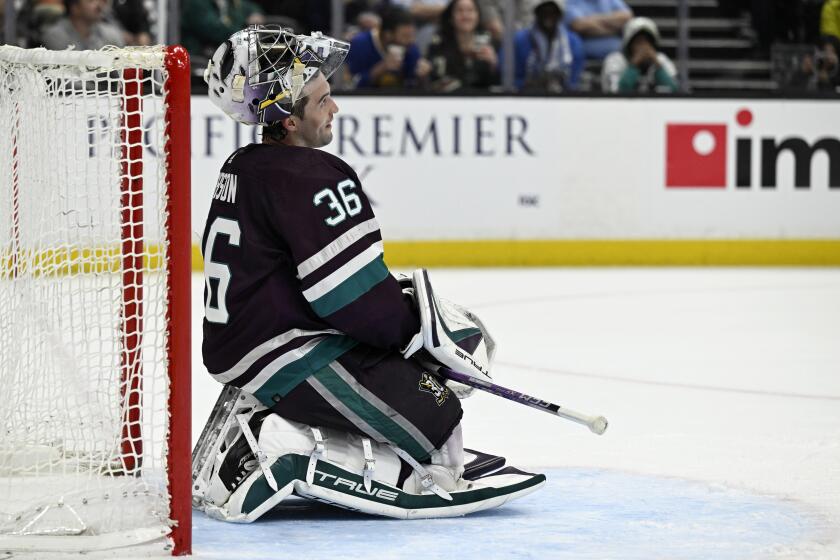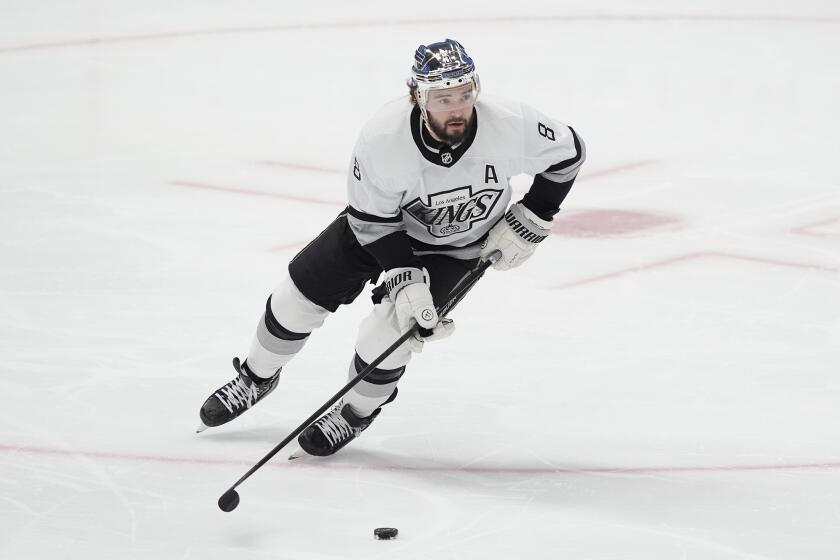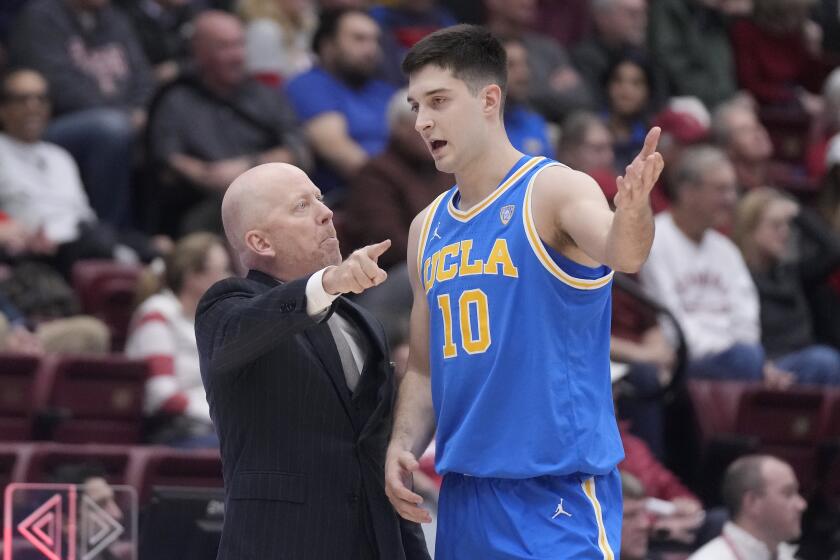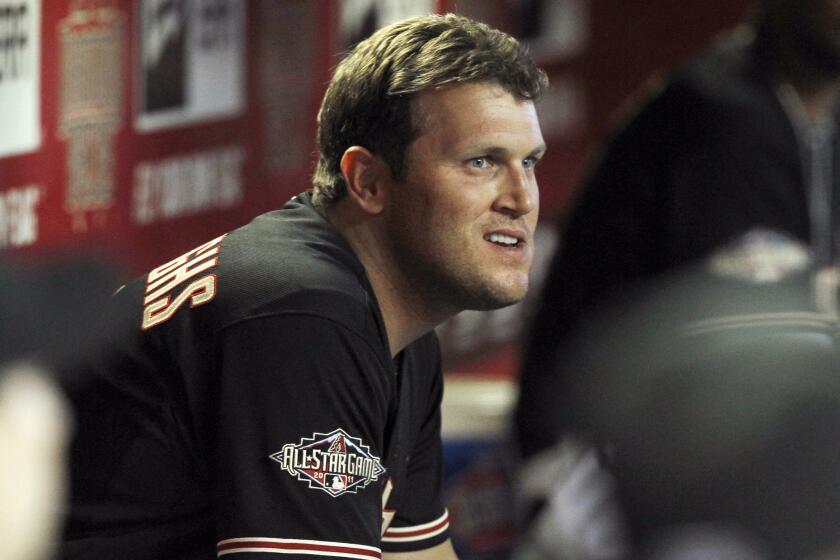The Liberation of Paris : Infielder Finds Himself Back in the Major Leagues After Nearly Losing Everything to Alcoholism
It was 2 a.m., just a few days after Christmas 1986, and Kelly Paris was nearing the end of a 45-minute drive over the dew-slickened back roads of North Carolina from Charlotte to Gastonia.
Paris was returning from a night spent drinking and playing pool. He was “20 seconds” from his front door when he steered his Trans Am into a turn he would never complete.
Paris, an infielder who had played in the major leagues with three teams, misjudged the turn. He lost control and the car slid off the road before hurtling down a ravine, rolling over and slamming into an oak tree. As Paris lay pinned against the door on the driver’s side, blood streamed down his face and hands, oozing across his fingers and covering the 1982 World Series ring he won with the St. Louis Cardinals.
“My back was killing me and I couldn’t move, so the first thing I did was wiggle my toes,” Paris said. “When I could do that, I breathed a sigh of relief. I told myself, ‘Just hang on and don’t die.’ ”
Paris’ personal wreckage included a broken back, ribs, sternum and wrist. It took 4 1/2 hours of surgery to repair lacerations around his left eye.
He spent the 1987 baseball season earning $4.25 an hour making dentures for a dental lab, and he began putting his body and life back together as well.
Last week, a few days past the 19-month anniversary of the accident--and after hundreds of hours of rigorous physical training--Paris completed a long, pain-filled road back to the major leagues when the Chicago White Sox promoted the 30-year-old third baseman from their triple-A affiliate in Vancouver.
“Basically, it’s a phoenix story,” White Sox scout Craig Wallenbrock said. “Kelly Paris came right out of the ashes to rise up and come back.”
Paris returns to Southern California tonight when the White Sox open a four-game series against the Angels at Anaheim Stadium. Looking back, Paris said the alcohol-induced crash that almost killed him actually gave him new life.
The player who almost lost everything because he could not negotiate a turn says he is well on his way to a turnaround.
“Everything bad that ever happened to me was because of alcohol,” said Paris, who attended Taft High in Woodland Hills and was originally selected by the Cardinals in the second round of the 1975 June draft. “No problems were ever solved through a bottle. I’ve tried, believe me.
“Baseball is not my entire life anymore. After the accident, I quit drinking. I was sober yesterday, I’m sober today and I plan to be sober tomorrow. Your priorities change immensely when you’re that close to death.”
Paris signed as a free agent with the White Sox last December. The contract was offered in response to a letter he sent to 20 of the 26 major league teams following the 1987 season. All he asked for was a chance to play again.
Al Goldis, the White Sox director of scouting and player development, recalled seeing Paris play for the Orioles’ triple-A affiliate at Rochester, N. Y. Goldis remembered a hard-nosed player with a volatile personality who was kicked out of the Dominican Republic winter league for throwing chairs into a swimming pool during a drunken binge.
“I never put him on my draft list because I didn’t think he was the kind of player I wanted,” Goldis said. “He really didn’t have control of himself. He was liable to explode at any time.
“But after I got his letter, I called him and he sounded like he was sincere about staying sober and wanting to play again. I knew he was a very tough out and those are the kinds of guys we were trying to attract into the organization. All he wanted was a chance. We gave it to him and he took advantage of it.”
Paris, who had been released by the White Sox during spring training in 1984, has played for five organizations. He appeared in 12 games with the Cardinals in 1982, spent almost the entire 1983 season with the Cincinnati Reds, batting .250 while appearing in 56 games, and had two five-game stints with the Baltimore Orioles in 1985 and ’86. He also played a year with Pittsburgh’s triple-A affiliate in Hawaii.
Paris said his own unfulfilled expectations contributed to his drinking problems. He was the shortstop who followed Robin Yount at Taft. And when Yount became a major league shortstop with the Milwaukee Brewers just 10 months after signing his first contract, Paris had visions of a similarly rapid ascent.
Despite pleas from his father and high school coach to accept one of the full-ride scholarships offered by USC and Arizona State, Paris opted to follow Yount into professional baseball.
“I expected to make it by the time I was 19 or 20,” said Paris, who lived in Westlake Village last winter. “I was kind of in awe of Robin, but he had the maturity I didn’t have. I was too blind to see the opportunities for maturity that going to college offered. I wanted to play baseball and that was it.”
But there was usually time for drinking. It wasn’t until his year in Cincinnati that Paris realized he had a problem.
“I was on a last-place team and I wasn’t playing much,” he said. “I looked for an outlet and I found the wrong one.”
Following the 1983 season, Paris checked himself into a alcohol rehabilitation center in St. Louis. He was sober for a short time, but it wasn’t long before he was drinking again.
“I guess I wasn’t mature, stable or secure enough to do something positive with my life back then,” Paris said. “But after the car accident, something clicked. I got another chance at life and after I signed with the White Sox I got another chance with baseball.”
Paris, 6 foot, 175 pounds, got himself back into playing shape by running and lifting weights on his own in North Carolina and working out with a personal trainer after moving back to Southern California in December. He played for a White Sox rookie team before heading to Florida for minor league spring training.
“It was the hardest spring training I’ve ever gone through,” Paris said. “All we did was run and run and run. It was difficult, but I figured if I was going to come back and play again, I wasn’t going to take the easy route. I took it my whole life and it was time for a change.”
Paris was batting .284 at Vancouver with 5 home runs and 52 RBIs--including 10 game-winners--and led the Pacific Coast League with 32 doubles when the White Sox summoned him to replace outfielder Ivan Calderon, who is out for the season with a shoulder injury.
“I think Kelly proved something to himself and the other players in the organization,” Goldis said. “It may look dim at times, but if you stay in there and fight, funny things can happen in this game.”
Paris is elated to be back in the big leagues, but, like his sobriety, he said he is taking it one day at a time.
“It’s been hard sometimes,” Paris said. “I’m not going to lie to anybody and say there aren’t nights when I feel like a drink. When you stop something you’ve done your entire adult life, there’s a void.
“But whenever I have that urge, I go for a walk or call a member of my family. Sometimes I just cry and go to sleep.
“But when I wake up the next morning, know I’m still sober and hear the birds singing, I’m glad to be alive.”
More to Read
Go beyond the scoreboard
Get the latest on L.A.'s teams in the daily Sports Report newsletter.
You may occasionally receive promotional content from the Los Angeles Times.

